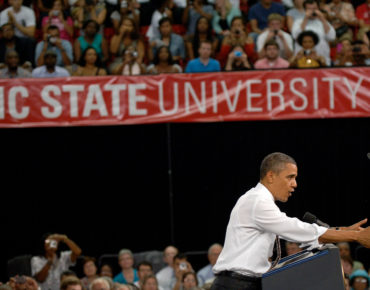Obama Brings Electronics Manufacturing Hub to NC

During today’s visit to Raleigh, North Carolina, President Obama came to North Carolina State University to announce the next manufacturing innovation institute. The “Next Generation Power Electronics Innovation Institute” will bring together six universities and 18 private-sector companies throughout the region to further drive research in next-generation power electronics.
The institute will receive $70 million over the next five years from the Department of Energy, which the involved businesses and academic institutions will match in addition to $10 million guaranteed to by the state of North Carolina.
“This is all about bringing back electronic manufacturing to the United States. It’s about creating the next generation of power devices that are more efficient at using electricity and do so with less heat loss,” said N.C. State Chancellor Randy Woodson today during President Obama’s visit.
As Obama took the stage, he reiterated Woodson’s declaration of intent, saying that his goal is to bring jobs back to U.S. manufacturing hotbeds like the Triangle area.
“I don’t want the next big job-creating discovery and research and technology to be in Germany or China or Japan,” Obama said to the 2,000 people that packed into N.C. State’s J.W. Isenhour Tennis Center today to hear the announcement. “I want it to be right here in the United States of America. I want it to be right here in North Carolina.”
Although the institute is meant to act as a regional hub for electronics research, the consortium pulls from a variety of institutions throughout the country, including not only the entire University of North Carolina system, but Arizona State University, Florida State University, the University of California at Santa Barbara and Virginia Tech.
Private-sector consortium members include the Durham-based company Cree, Delta Products, John Deere, Toshiba and Vacon, which Obama visited earlier in the day prior to making the announcement at N.C. State.
One project that the institute will focus on is the development of wide-bandgap semiconductors, which are expected to boost the efficiency of electronics that range from your cell phone to industrial-scale drive motors thanks to their durability and higher operating temperatures.
The White House has said that it expects the innovation institute to make wide-bandgap semiconductors technologies competitive with current silicon-based power electronics within the next five years.
Based on collaborative efforts between NCSU and RTI International, the area has already made a name for itself in semiconductor research, but with the institute coming to the university’s Centennial Campus, a growing number of local companies will have a central place to further drive technological development. N.C. State will house all relevant testing equipment, and will also oversee workforce development programs and education that the new institute will make possible.
According to the White House announcement, the target of the institute falls on small-to-medium-sized manufacturers by helping them to invent, design and manufacturing new chips and devices. In addition, it expects to pair these smaller enterprises with giants such as John Deere and Delphi, which in turn will bring to the table training, education programs and internships to make the ecosystem more competitive on a global scale.











